The longest-serving president in Argentine democratic history (a full decade between 1989 and 1999), Senator Carlos Saúl Menem died last Sunday at the age of 90 after fighting health complications confining him to hospital since mid-December – a life of passion ending on Saint Valentine’s Day.
President Alberto Fernández decreed three days of national mourning in the wake of the news and the former head of state was laid to rest on Monday at the La Tablada Islamic cemetery in Buenos Aires Province.
Menem’s presidency was marked by the dollar parity known as ‘convertibility,’ two devastating terrorist attacks in 1992 and 1994, the 1994 constitutional reform that paved the way for his re-election the following year and the helicopter accident death of his son just two months before that triumph, among other things. Almost all the highlights of his presidency were concentrated in his first term because his second term was largely sacrificed to securing a third, a feat which eventually eluded him.
His presidency was preceded by three terms as governor of his native La Rioja and followed by three terms as national senator for that province as from 2005. Only his middle gubernatorial term (1983-1987) was completed because the first was interrupted by the 1976 coup and the last by winning the presidency in 1989. His third senatorial term was interrupted by his death last weekend but until then the parliamentary privileges served him well to avoid such legal complications as a conviction for gun-running to Croatia (1991) and Ecuador (1995).
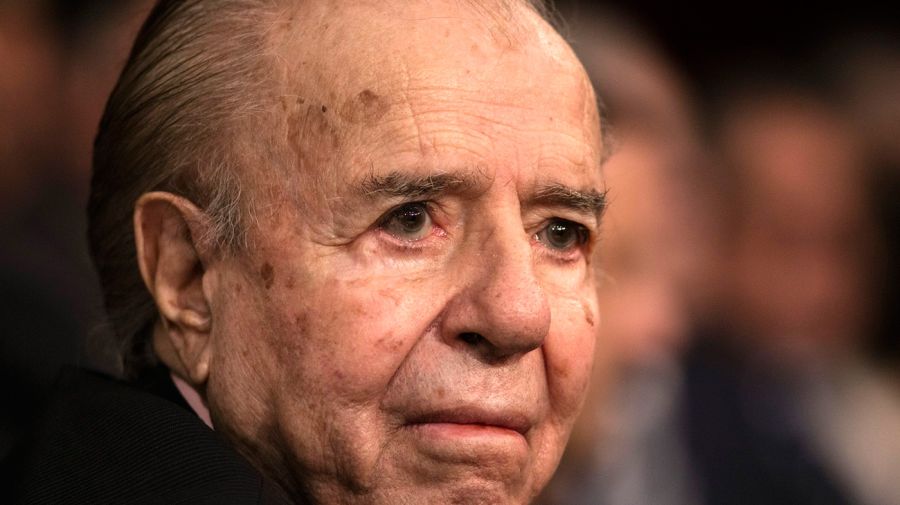
Early years
Menem was born on July 2, 1930, in the small La Rioja town of Anillaco, which even today has only around 3,000 people – back then there were just four cars in the whole town and Menem was inordinately proud of his Syrian immigrant father Saúl Menehem owning one of them. Both his parents were Syrian-born (the complex religious affiliations of the future president and his family will be described below). Little Carlos (and he was little, not growing beyond 1.65 metres, which did not impede a schoolboy dream of becoming a basketball star) received a conventional primary and secondary education within the local state system before entering the Law Faculty of Córdoba University in 1949 and graduating just two months before the 1955 coup.
While of age to have been a “Peronist of the first hour” in his teens, his militancy began in 1951 when he was introduced to two VIP spectators after a university basketball match, Juan and Eva Perón.
Menem’s first arrest came in 1956 when he was linked to the Peronist uprising headed by Generals Juan José Valle and Raúl Tanco. Between his release in 1957 – when he founded and headed the La Rioja chapter of Peronist Youth – and 1972 his main activity was as a labour lawyer but he made sporadic bids to break through the ban on Peronism – running for provincial deputy in his native Anillaco in 1962 under a Popular Union label (winning the seat only to be ousted by the coup against Arturo Frondizi just 10 days later) and mounting his first gubernatorial candidacy under the same label in 1963 while chairing the La Rioja Justicialist Party at the same time, only to obey Perón’s orders for all Peronists not allowed to run as such to abstain.
The next year Menem visited Perón in his Spanish exile, travelling onto ancestral Syria where he met Zulema Yoma (also from La Rioja with Syrian Muslim origins), whom he married in 1966 in a Muslim ceremony followed by a Catholic blessing.
A co-passenger on the plane bringing Perón back to a bloodstained welcome at Ezeiza on November 17, 1972, Menem had no problem winning his native province in the 1973 elections with 57.5 percent of the vote (20 of the 25 provincial legislature seats) on the back of a highly personalised campaign sporting the Facundo Quiroga caudillo look. This wild look identified him with the left wing of Peronism and he also gave La Rioja Argentina’s highest percentage of public employees after Formosa but already then (with his shrewd brother Eduardo as his right-hand man) he was showing signs of what was to come – an action plan including tax breaks (especially for mining companies) brought new life to a backwater province with only 136,000 inhabitants in the 1970 census.
All that ended with the 1976 coup. Every Peronist governor was ousted but curiously enough, Menem was the only one to be imprisoned apart from Río Negro’s Mario Franco – perhaps the only motive was the “gut feeling” of the military regime’s Interior Minister Albano Harguindeguy (“cosa de piel” in his words) or perhaps there was another reason. He was successively detained in Magdalena, Mar del Plata, Tandil and Formosa where he fathered Carlos Nair (the Perfil publishing house was later to suffer greatly for Noticias magazine divulging this indiscretion). Forbidden to attend his mother’s funeral in 1977, Menem vowed that he would never forgive the military but he later famously did – in 1990 with his controversial pardons (also extended to Montoneros).
When democracy returned to Argentina, Menem successfully resisted the Radical tide of 1983 to win his home province with 56.5 percent of the vote, as against the previous 57.5 percent. The newly reinstalled governor was careful to observe peaceful co-existence with the Radical President Raúl Alfonsín (even backing him in the 1985 Beagle Channel plebiscite), in an uneventful term with a 1986 visit by US Senator Edward Kennedy to the province as one of the few highlights. In order to continue in office, Menem needed to reform the 1855 provincial constitution. He did and was duly re-elected in 1987 with 62.4 percent of the vote.
From the word go in his second gubernatorial term Menem was gunning for the national presidency and he competed in the 1988 Peronist presidential primary. He seemed to stand no chance against Buenos Aires Province Governor Antonio Cafiero, a wily political veteran at the height of Renewal Peronist prestige with a Córdoba running-mate, but he undercut Cafiero in Greater Buenos Aires via his running-mate, Lomas de Zamora Mayor Eduardo Duhalde, and also posed as an anti-system candidate in a country heading towards hyperinflation. The Menem-Duhalde ticket triumphed in the primary with 54 percent of the 1.5 million card-carrying Peronists voting, winning all but five provinces. This vote was Menem’s toughest battle – victory in the actual presidential elections in 1989 was a foregone conclusion given hyperinflation with 48.5 percent of the vote for Menem as against 37.1 percent for the Radicals and absolute majorities in both houses of Congress. Eight weeks later Menem was president five months ahead of time.
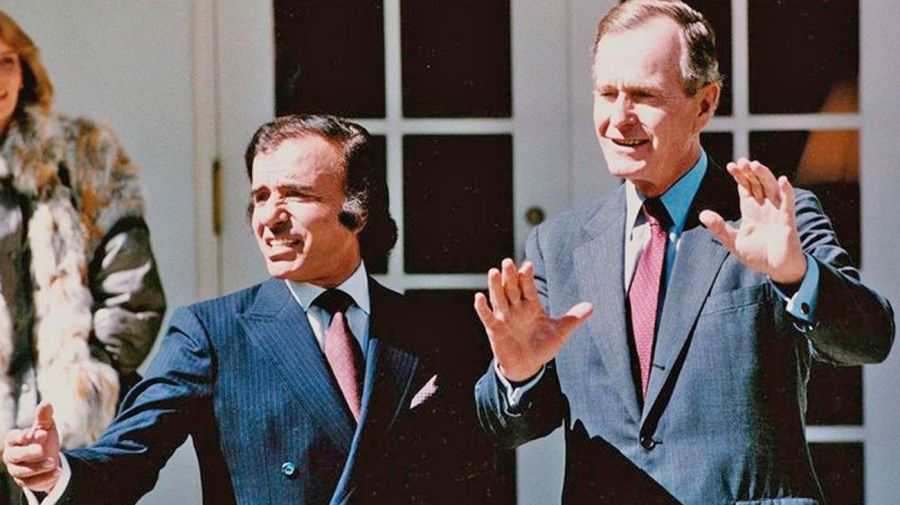
President Menem
Freshly installed in the Casa Rosada, Menem entered into his own inflationary spiral in his first two years with no way out (not even the confiscatory Bonex Plan of late 1989) – until convertibility in 1991, with Domingo Cavallo as economic czar, banished inflation.
But within three months of taking office in firm alliance with the neo-liberal Alvaro Alsogaray, Menem was already announcing privatisations, starting with ENTel telephones and Aerolíneas Argentinas. From convertibility onwards there was strong growth for the rest of his presidency except for 1995 and 1999 (both election years, coincidentally). A stable currency permitted the advent of mortgages while the creation of the AFJP private pension funds in 1994 gave birth to capital markets.
Argentina became a haven for foreign investors. Yet unemployment also grew along with the economy and productivity, rising from eight percent to a peak of 18 percent in 1995, while 36 percent of the population fell below the poverty line. Foreign debt also more than doubled to US$146 billion by 1999 with fiscal surpluses posted only in 1995 and 1996 despite privatisation windfalls.
The privatisations under the notorious Public Works Minister José Roberto Dromi were the trigger for numerous corruption scandals with Swiftgate (1990) perhaps the most notorious. Menem sought to shield himself judicially by packing the Supreme Court from five justices to nine in 1990 to form an “automatic majority.”
The most literally explosive events of his first six years were the terrorist attacks on the Israeli Embassy (1992) and the AMIA Jewish community centre (1994), followed by the blast at the Río Tercero munitions plant in 1995. Quieter developments were the decentralisation of health and education to the provinces in 1991-1992, in order to make balancing the budget for convertibility purposes easier and the abolition of military conscription in 1995 just ahead of elections in reaction to the brutal death of conscript Omar Carrasco.
In years of the Washington Consensus, foreign policy was firmly pro-Western with “carnal relations” with the United States under his Oxford-educated Foreign Minister Guido Di Tella (including participation in the 1991 Gulf War and becoming a major non-NATO ally of the US in 1998), restoration of diplomatic relations with Britain in 1990 (after promising “blood and fire” to recover the disputed Malvinas Islands in his 1989 election campaign) and exit from the Non-Aligned Movement. Menem was also a co-founder of the Mercosur regional trade bloc in 1991.
Just as in La Rioja, Menem needed a constitutional reform for re-election and this he secured via the 1993 Olivos Pact with Alfonsín leading to the constitutional reform of 1994. With his magic 1989 date of May 14 again falling on a Sunday, Menem was duly re-elected with almost half the vote, winning every province (although not the Federal Capital). But two months beforehand Menem paid a heavy price when his son Carlos (aged only 26) perished in a helicopter accident with his estranged wife Zulema Yoma (already kicked out of Olivos presidential residence in mid-1990) accusing the presidential entourage of plotting the death of her son.
Throughout the decade of these two terms Menem had some 50 ministers in eight portfolios.
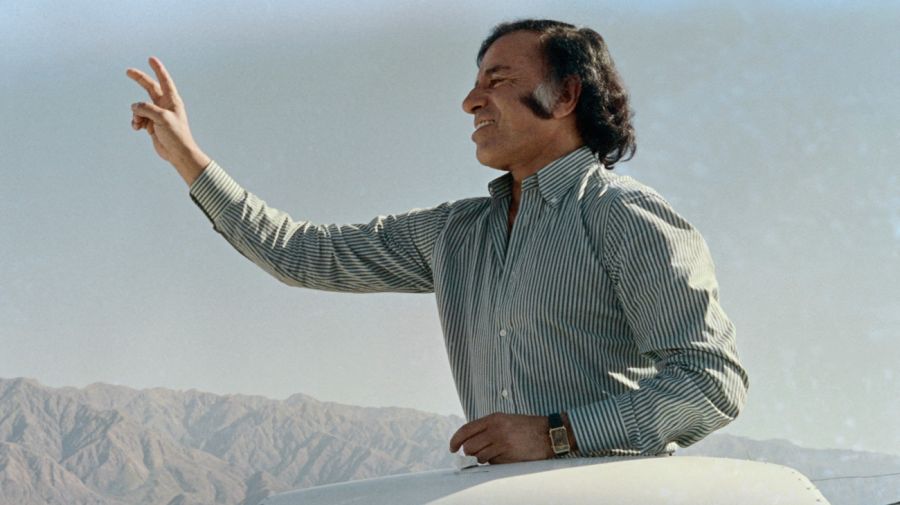
Beyond the Casa Rosada
After spending most of his second term unsuccessfully trying to clear the right to run for a third in succession amid nagging corruption scandals, Menem was constitutionally kosher to run again in 2003 and went for it, having in the interim married a former Miss Universe, Chile’s Cecilia Bolocco, a marriage producing a son named Máximo (born 2003). Despite a 2001 arrest for gun-running to Croatia and Ecuador, Menem actually won those elections with 24.5 percent of the vote against two rival Peronist lists apart from other opposition candidates but, more likely to lose than to gain votes in a run-off against the runner-up Néstor Kirchner backed by caretaker president Duhalde, he stepped down and handed Kirchner the presidency by default.
In 2005 he entered the Senate where he remained for the rest of his life after losing a La Rioja gubernatorial bid in 2007, gaining re-election in 2011 and 2017 but always for the third runner-up seat. This seat did not serve so much to represent his native province as to ensure parliamentary immunity from various court cases including gun-running, AMIA and Río Tercero among others.
Menem, however, was not only known for his politics – his flamboyance and playboy image preceded him. Whole pages of this newspaper could be filled with anecdotes of the “pizza and champagne” frivolity permeating his presidency but suffice it to mention his “mine, mine, mine,” Ferrari, claim to have read all the books of the entirely verbal philosopher Socrates, telling impoverished indigenous children in Salta that he was building space-ships to project them to Japan and Korea, as well as his eagerness to welcome such famous visitors as The Rolling Stones, Michael Jackson, and Madonna (while shooting Evita for Alan Parker in 1996).
Finally, his burial in the Islamic Cemetery at La Tablada alongside his son and the presence of both a Catholic cross and Muslim crescent at his wake raise the question of the late former president’s religious identity. Menem is widely considered to have adopted the Catholic faith to reach the presidency since the Constitution made the country’s official religion mandatory for presidential office prior to its 1994 reform (under Menem) but it may not have been so simple.
He had already been baptised at least once by the time he became La Rioja governor in 1983 (and reportedly as early as his Córdoba student days). Nor is even the Muslim identity of his parents entirely clear – his father had the non-Muslim name of Saúl while his mother is said to have had a special devotion for the Virgin Mary. Whatever his origins, Menem was always one of the most orthodoxly Catholic of Argentina’s presidents, maintaining close friendships with the reactionary Buenos Aires Cardinal-Archbishop Antonio Quarracino (he far less keen on his successor Jorge Bergoglio) and with the conservative Pope John Paul II (again, he was far less keen on Pope Francis in his last years), as well as being stoutly opposed to abortion.
Twice divorced, Menem survived by three children: his daughter, Zulema, and sons Carlos Nair and Máximo.
‘Impunity’: DAIA criticises late leader over terrorist attacks
Amid the nationwide mourning for ex-president Carlos Menem last Sunday, the DAIA Jewish community organisation umbrella was a fierce negative voice, repudiating his “impunity” for his presumed responsibility for the terrorist bomb destruction of the Israeli Embassy and the AMIA Jewish community centre in 1992 and 1994 respectively with the following statement.
“Following the death of ex-president Carlos Menem, DAIA, representing the Argentine Jewish community, would like to express that the two worst terrorist attacks in Argentine history occurred during his presidency.
“He died a free man even though his government used the Argentine state institutions to perpetuate impunity and cover up the responsibility of those committing the attacks and their accomplices.
"The neglect and, above all, the complicity with the suspects of those crimes explains why both massacres enjoy impunity to this day.
“Menem died protected until the last day of his life by his senatorial privileges. He never paid for his responsibility for covering up the AMIA-DAIA attack.
“As a human rights organisation, DAIA does not forget either its indignation over the sad decision to pardon those responsible for the crimes committed during the military dictatorship, mocking justice and the families of the missing and survivors alike.”

















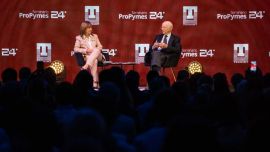
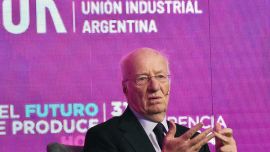

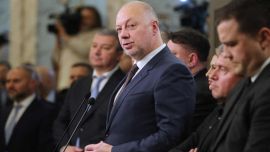
Comments